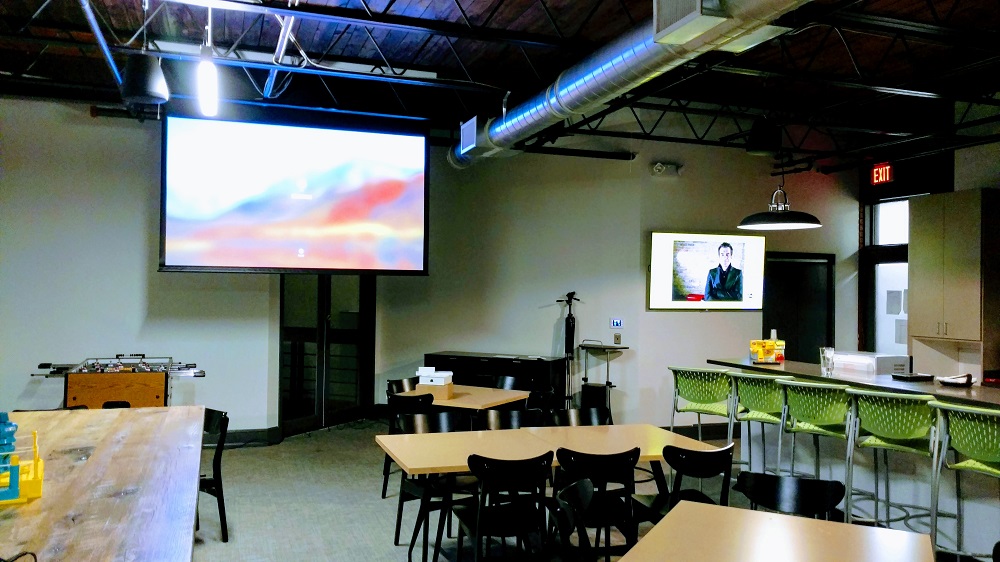Depending how you choose to look at it, Raymond Rooks was forced into the decision to start Audiotech, a boutique resimercial integration firm in Richmond, Va. founded in 2003, when he was unable to achieve the management position he deserved with his former employer.
While Rooks was able to escape his adversity and find a positive outcome on his own, the sting of being unfairly passed over still sits with him despite his success. Not that he regrets his decision to strike out on his own, but who among us hasn’t wondered what might have been? Especially when what might have been is so close to what should have been.
Regardless, it was clear from an early age that Rooks had the passion for technology that leads so many to the AV industry.
 A Passion for Technology
A Passion for Technology
“I would hang out at the Radio Shack of all places,” says Rooks. “The guys in the Radio Shack knew my name. When the new Radio Shack catalog came out, they would save it for me. It broke my heart when Radio Shack ran out of business because I should have been doing commercials for them.
“That’s how it all started: doing electronics kits and building alarm systems out of telephones in my bedroom. By the age of 12 or 13, I was installing car stereos. I used to do those for friends of the family and neighbors,” he says.
After high school, Rooks joined the Army where his main military occupational specialty (MOS) was utilities equipment repair. “In hindsight I would have been a communications guy, which would have been more closely related to what I do now,” he says. “But I did get electronics training through my time in the military.”
After the military, Rooks continued as a reservist along with several jobs including a part-time company he started on his own. AV wasn’t something he set out to do but rather something he was drawn to through his interested in technology.
“I kind of just stumbled upon it,” says Rooks. “Once I moved to Richmond I would see AV companies around. I would go to those companies not looking to work there but just to marvel at the things they had. The first time I went to a company that had a home theater setup it blew my mind.”
“I started my first company, Sound and Secure, at 22 as a part-time business,” he says. “I would install car stereos, CD changers, cell phones back when they were permanent installs in cars. Then it transitioned to working for a music services provider franchise company for a few years. That’s where I learned the commercial side.”
The Glass Ceiling
Along with learning the commercial side of technology integration, Rooks learned that the AV industry wasn’t particularly representative of people like him that loved technology but came from a diverse background.
“I was the only black person there out of a team of installers, service techs, and office people,” he says.
“They treated me well, although there were some racial jokes and stuff like that which I guess they didn’t think was harmful,” says Rooks. “A couple of times I didn’t think it was funny. Overall my experience there was positive. When I left there, they even asked me to subcontract because they liked my work ethic.
Read: Highlighting the Business Benefits of Diversity, Equity and Inclusion
“One of the reasons I left was because I was promised a position as management. I came in as an installer and became a field service technician within two weeks,” he says. “I was told I would become the department manager and all that stuff. It kind of disappeared. They brought someone else in even though they kept telling me my performance was great.”
The promise never coming to fruition, Rooks decided it was time to strike out on his own. He was ready for management and more responsibility. If his current employer wouldn’t give him the opportunity, he would create the opportunity himself.
“I felt like there was a glass ceiling there that I wasn’t going to break,” says Raymond, despite the fact that people within his office wanted to see him break through. Particularly the women in his office who likely experienced their own obstacles. “They knew if I went the work would pile up,” he says. “I would try to work like two or three guys. I had a passion for it.”
Ultimately it was a systemic issue that kept Rooks from getting the opportunity he deserved. “There were offices throughout the east coast, and the ownership for the company was up north. They pretty much controlled everything,” he says. “I didn’t see a long-term opportunity, so I said my best bet was to start my own company.
“I have a two-car garage on my house and I built another two-car garage for storage in my backyard. That’s where I started the company,” says Rooks. “Ten years ago, we moved to an office closer to the city and we’ve been there ever since.”
Creating Opportunity
As with many integrators that transition into an ownership position, Rooks experienced growing pains when business management was added to his workload on top of technology integration. “The sales portion of it I didn’t know, but I found out because I’m a people person it makes me a pretty decent salesperson,” he says. “I also have a passion and knowledge, so I’m not just selling but believing in what I’m selling.”
“What I didn’t realize was dealing with employees and the administrative portion of it was a lot more than what I thought it was,” says Rooks. “I actually became a part of a business group which helped me a lot.” Business Network International (BNI), an American networking organization, provided Rooks with experienced peers that could help him avoid potential pitfalls many new business owners fall into. He met with other business owners in groups and through one-on-ones to gain insight before he made potential mistakes.
“I learned as I was building the business was always have a business attorney you can talk to just for structure purposes. Always have a great payroll company and a great CPA that’s in your corner that you can talk to,” says Rooks. “Those things saved me from the pitfalls of business.” Learning those facts in advance was integral to saving massive headaches down the line, and he credits his peers in BNI for helping him understand the value of trusted partners on the legal and accounting side.
Read: A Business Case for Diversity in Pro AV
When it came to employee management, those pitfalls were more difficult to avoid. “I learned that I need an employee manual,” says Rooks. “You can’t just go out and hire guys and not have something in writing that they sign off on because not everybody has the same work ethic that I have as a business owner.”
The other struggle of ownership came with giving up oversight. “Having the experience a few times of leaving guys on a job site earlier on, and I come back and it’s not up to may standards and they’re not where they’re supposed to be as far as the timeline,” says Rooks.
“Having good employees changed all that,” he says. “I found that if I had at least one guy who’s experienced on the job and has some pride in the work that he’s doing that puts me at ease and I can step away from the job.” The growing pains were there as they are with any business. Eighteen years later Rooks employs five professionals he’s trained to avoid pitfalls and churn out projects that are up to his standards.
Audiotech is going strong and Rooks is succeeding in an even more expansive management position than the one he was denied earlier in his career.
Fostering Diversity
“I hire guys of all races,” says Rooks. “I’ve hired guys where I didn’t even know what their ethnicity was. You can do those things if you own the company.” Rooks liked to post job listings online and narrow down candidates that way. It allows him to methodically work his way through a large pool of candidates and find those that will take on the work ethic necessary for his company.
From time to time, though, he still finds candidates through degrees of separation and networking. “I started off using guys that were subs the first few years because I was on the jobs also,” says Rooks. “After that I started hiring and I would train them myself. Now when I hire someone my lead tech trains them.
“I used to hire based on technical expertise but I found out a lot of times that equated to bad habits. It’s hard to break bad habits,” says Rooks. “Now when I hire, first they have to have a great personality because they’re face to face with customers.”
“I look for some sort of skills that show they have the potential to be able to learn AV. It could be carpentry skills so they understand how a house is framed for when they run cables. It could be computer skills so they understand signal flow. Everything else falls in place after that,” he says.
When asked about how to foster diversity, Rooks is cautious to recommend simply identifying minorities in order to hit certain quotas as that can be looked at negatively. “Everyone that I know that I’ve talked to who has said something about diversity within their job, they don’t want an opportunity over someone else because of their skin color. They just want a shot,” says Rooks. “That’s the thing. Give me an equal shot and let me do the rest.”
Read: ArtMedia Corp and Diversity in the AV Industry
The goal for organizations should then be identifying those individuals in positions of power within the company that are not giving people an equal shot. “Everything starts with people,” says Rooks. “If you have people in positions who have biases where they’re promoting and bringing training opportunities about it ends right there. There’s no getting past that point. So the biases need to be removed.
 “I never give up on people and I never think a person can’t change. But until those people recognize those biases are there and try to work to change them, the glass ceiling will always be there,” he says. However, while it’s typically quite obvious to recognize bias, that can be more difficult in an industry like AV integration.
“I never give up on people and I never think a person can’t change. But until those people recognize those biases are there and try to work to change them, the glass ceiling will always be there,” he says. However, while it’s typically quite obvious to recognize bias, that can be more difficult in an industry like AV integration.
“There aren’t that many minorities in our field to begin with. So if you have a manager who’s not hiring or advancing someone who’s black or Hispanic it’s hard to say they’re biased,” says Rooks. “It’s very difficult because you need to monitor how people are hiring and advancing. Then if you see something that doesn’t look right, how do you address it? Because maybe that person that did the hiring already has an excuse laid out. It’s very difficult,” he says.
“Usually because of the company culture, if you’re a person of color you have a pretty good idea of what goes on every day not just what goes on because of advancements,” says Rooks. In general, he says, if companies want to foster more diversity within their organizations, they need to remove those glass ceilings keeping diverse employees from sticking around or having a larger impact on the organization.
“Promote from within if you have excellent talent, and develop that talent,” says Rooks. “There’s going to be loyalty and appreciation there. That person’s going to feel like they’re part of the company and they have a stake in that company. “Usually, just by having someone who is a minority in a leadership position, they are going to be more open to bring other people in without having those biases. Just having them in that position is going to be a plus,” he says.
“But I think they also have some responsibility to speak out when they see inequality or biases,” says Rooks. “That’s a different conversation than speaking up to bring up a higher percentage of minorities.”
Ultimately, though, fostering diversity starts at the top.
“If you have a CEO or a board of directors, they control the attitude of the company,” says Rooks. “They control what’s accepted and what’s not accepted. If the company culture is fine then I think the company will become more diverse and it will be a better working environment overall.
“If you’ve got a CEO that’s looking to foster diversity in their company, it’s going to happen,” he says.











